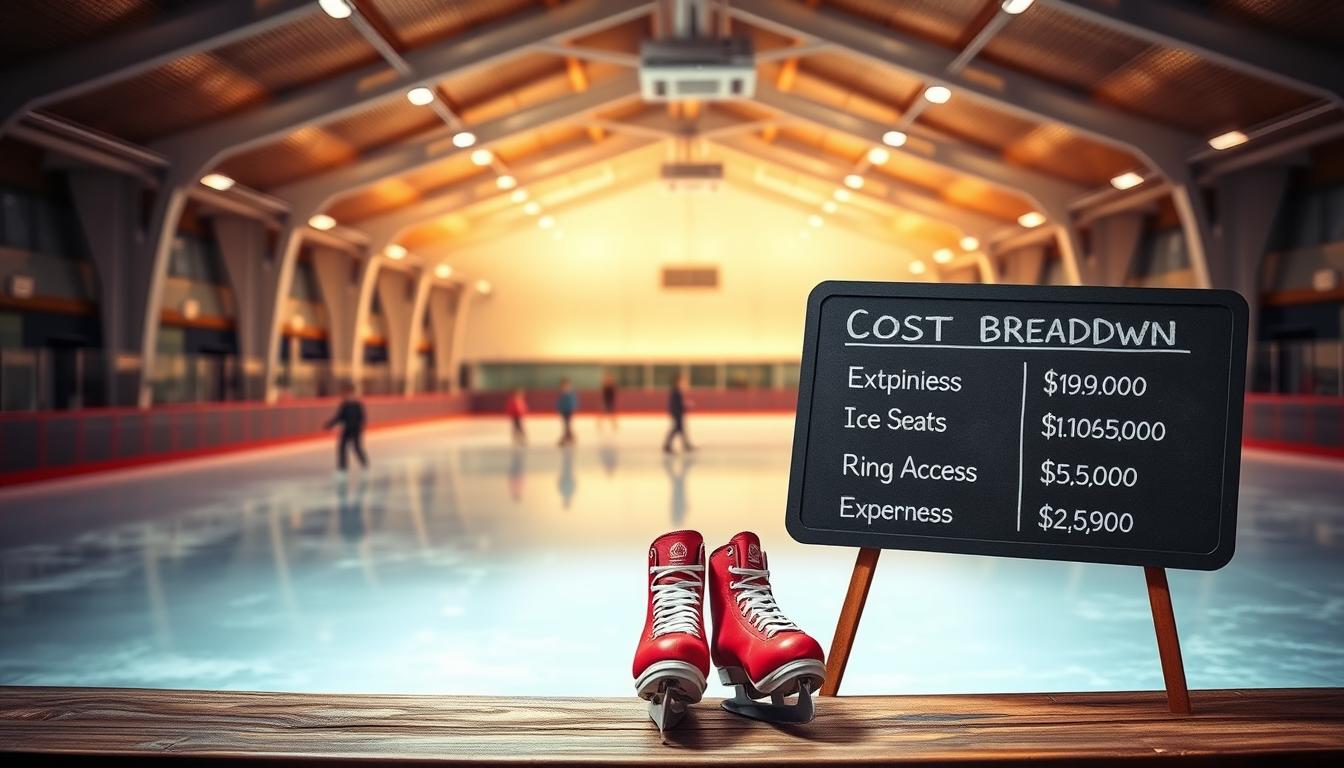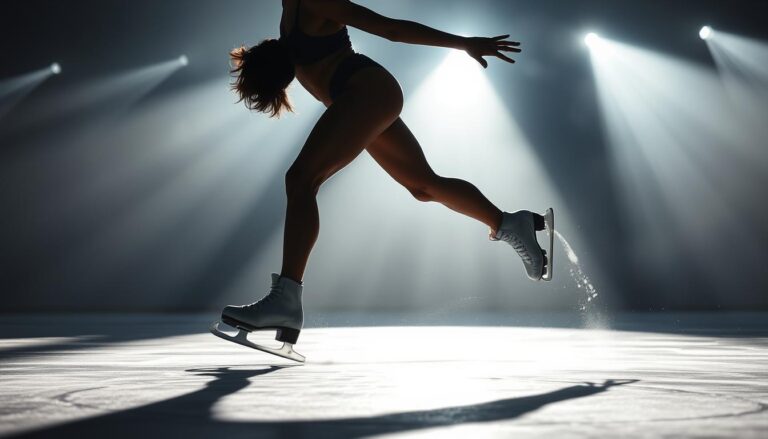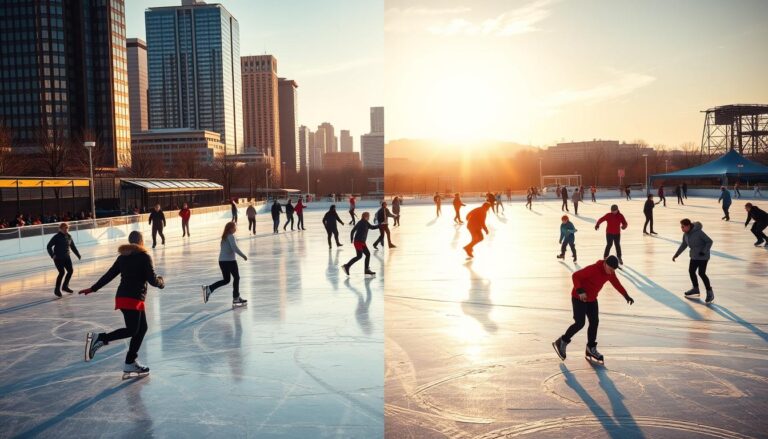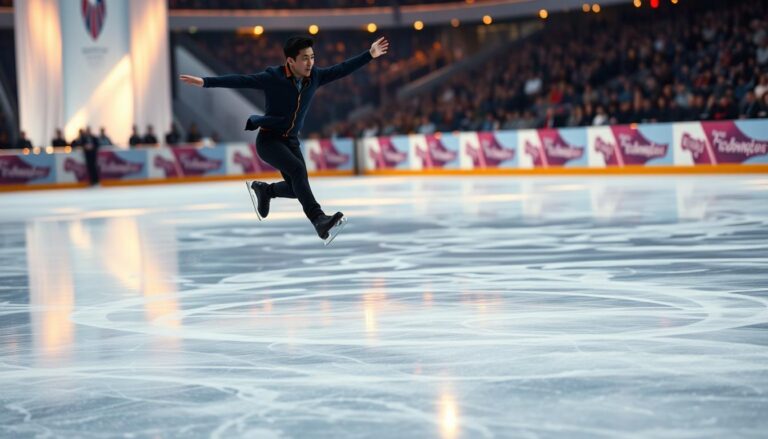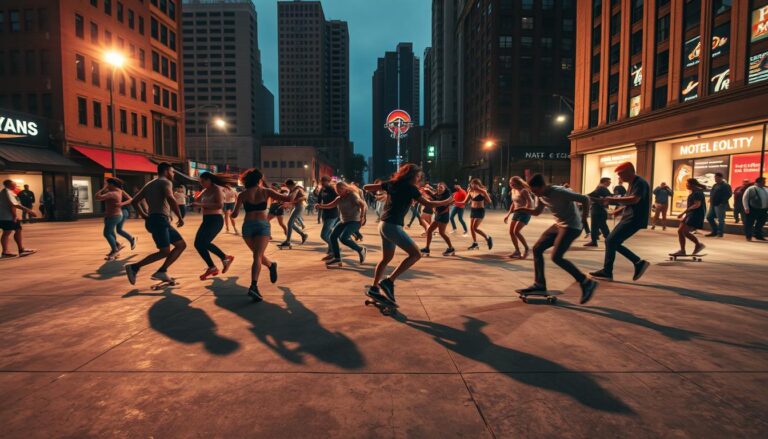The Cost of Skating: What You Need to Know
Imagine stepping onto a smooth skating surface, your blades ready to carve through the crisp atmosphere. Understanding the skating cost is your first step toward this exhilarating experience. Skating isn’t just a sport—it’s an investment in fitness, fun, and personal skill development.
Whether you’re a curious beginner or a passionate enthusiast, knowing how much is skating can help you plan your budget and avoid unexpected expenses. The total skating cost varies widely depending on multiple factors, from equipment to venue selection.
Professional skaters and recreation departments nationwide recognize skating as an affordable fitness activity with diverse entry points. Your initial investment can range from budget-friendly community rink sessions to high-end professional training packages.
This guide breaks down every financial aspect of skating. You’ll discover pricing strategies, equipment costs, lesson expenses, and smart ways to minimize your spending while maximizing your skating.
From roller rinks in urban centers to ice arenas in suburban landscapes, skating offers something for every skill level and budget. Understanding the nuanced pricing structure empowers you to make informed decisions about your skating journey.
Expect to explore detailed breakdowns of rental fees, equipment prices, session costs, and insider tips for reducing your overall skating expenses. Whether you’re interested in recreational skating, competitive training, or simply enjoying a weekend activity, this guide provides transparent insights into the financial world of skating.
Get ready to unlock the secrets of smart skating investments. Your adventure starts here—no prior experience required!
Understanding the Basics of Skating Expenses
Getting into skating is more than just loving it. It’s about knowing how to handle your money. Whether you’re new or already into it, knowing the costs of ice skating is key.
Different Types of Skating Activities
Skating isn’t for everyone. Each type has its own price:
- Recreational Skating: The cheapest option
- Figure Skating: Needs special gear
- Hockey: Can be the most expensive
- Roller Skating: A cheaper choice
Common Cost Factors to Consider
Several things affect your skating costs:
- Equipment quality
- Rink admission fees
- How often you skate
- Need for lessons or training
Initial vs Ongoing Expenses
Knowing the difference between one-time and ongoing costs is smart. First-time costs include:
- Skates ($50-$500)
- Protective gear
- First lessons
Then, there are ongoing costs like rink fees, keeping gear in shape, and advanced training. Planning helps you enjoy skating without spending too much.
How Much Is Skating at Indoor and Outdoor Rinks
Many people love to skate in the winter. But, they often wonder how much it costs. Knowing the prices at skating rinks can help you enjoy skating without spending too much.
The cost of skating changes based on a few things. Where you skate, whether it’s indoors or outdoors, and when you go can affect the price. These factors all play a role in how much you’ll pay for your ice time.
- Indoor rinks usually cost between $8-$15 per session
- Outdoor rinks often have lower prices
- Skating during busy times or on weekends might cost more
Now, let’s look at the typical prices at different skating rinks:
| Rink Type | Average Admission | Skate Rental |
|---|---|---|
| Municipal Indoor Rink | $10-$12 | $3-$5 |
| Private Indoor Rink | $12-$18 | $4-$6 |
| Outdoor Community Rink | $5-$8 | $2-$4 |
Pro tip: Many rinks offer discounts for off-peak hours or package deals for multiple visits.
When planning your skating budget, remember to add costs like parking and skate rentals. Some rinks have season passes that can save you money if you skate often.
- Check for student discounts
- Look for family or group rates
- Consider membership options for regular skaters
Prices at your local rink might change, so it’s smart to call ahead or check their website for the latest prices.
Essential Skating Equipment and Their Prices
Getting ready for skating means making smart choices. You need to balance cost, safety, and performance. Whether you’re new or aiming high, knowing the right gear is key to a great skating experience.
Skates: Entry-Level to Professional
Ice skating prices change based on your skill and the gear’s quality. Beginners should plan to spend:
- Entry-level recreational skates: $50-$100
- Intermediate skates: $100-$250
- Professional-grade skates: $300-$800
Protective Gear Investment
When you skate, safety is a must. You’ll need:
- Helmets: $30-$100
- Knee pads: $20-$50
- Wrist guards: $15-$40
- Padded shorts: $40-$80
Maintenance Tools and Accessories
Keeping your gear in shape needs some extra cash. Set aside for these must-haves:
- Blade sharpening: $5-$15 per session
- Skate guards: $15-$30
- Blade cleaning kit: $10-$25
While it might seem pricey at first, good gear pays off. It improves your skating and lasts longer. Smart spending now saves money later.
Skate Rental Fees and Options
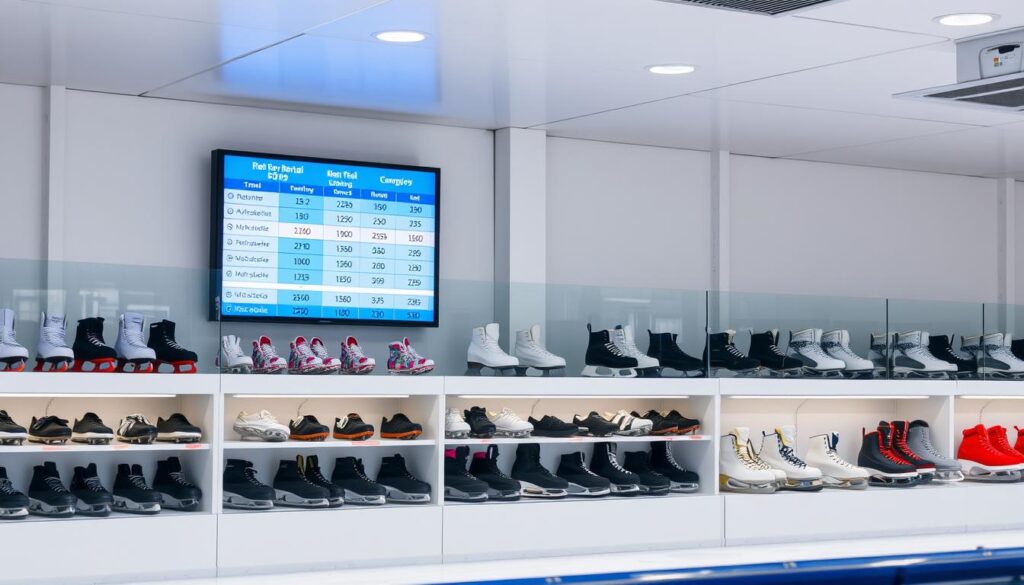
Skating doesn’t have to be expensive. Skate rental fees are a great way to enjoy skating without buying gear. Knowing your options can help you save money and have fun.
Rental prices change based on the type of skating and where you go. Most places charge between $3 and $10 per session. Some places offer deals that make skating cheaper.
- Indoor rink rentals: $5-$8 per session
- Outdoor rink rentals: $3-$6 per session
- Weekend and holiday rates: Slightly higher pricing
| Rental Type | Average Cost | Duration |
|---|---|---|
| Single Session Rental | $5 | 2-3 hours |
| Daily Rental | $10-$15 | Full day |
| Multi-Session Package | $20 | 5 sessions |
Pro tip: Many rinks offer discounted skate rental fees during off-peak hours. Check local rink schedules for budget-friendly skating activities that won’t strain your wallet.
Community centers and parks often have cheaper options. Students, seniors, and groups can find special rates. This makes skating affordable for everyone.
- Check for membership discounts
- Look for promotional rental days
- Compare prices across different venues
Ice Skating Rink Admission Costs
Finding out how much it costs to skate can be confusing. Whether you skate a lot or just sometimes, knowing the prices helps. It lets you enjoy skating more without spending too much.
Single Session Rates
Prices for skating vary based on where you skate and when. Here’s what you usually pay:
- Weekday afternoons: $8-$12
- Evenings and weekends: $12-$18
- Busy times (weekends and holidays): $15-$22
Season Pass Benefits
Season passes make skating cheaper for regulars. They save a lot of money.
| Pass Type | Price | Benefits |
|---|---|---|
| Junior Season Pass | $150 | Unlimited skating, weekday access |
| Adult Season Pass | $250 | Unlimited skating, all-hour access |
| Family Season Pass | $400 | 4 family members, full rink privileges |
Group Discounts Available
Groups can save a lot. Pro tip: Many places offer special deals for:
- Birthday parties
- School groups
- Sports team practices
- Corporate team-building events
Most places give 10-20% off for groups of 10 or more. This makes skating cheaper for everyone in the group.
Seasonal Price Variations in Skating
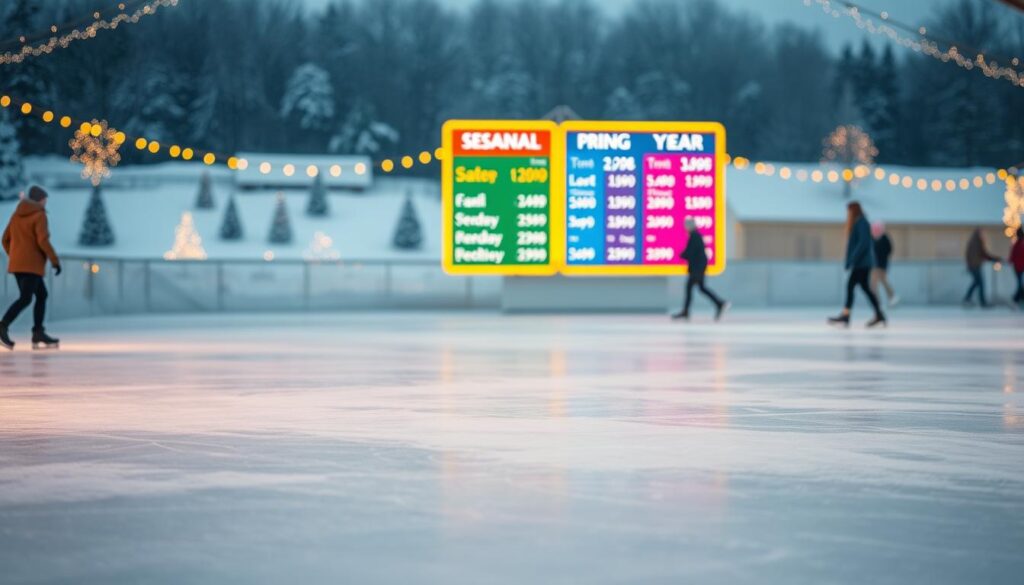
Ice skating prices change a lot throughout the year. Knowing these changes can help you plan your skating better and enjoy it more.
Winter might seem like the best time for skating, but prices aren’t always clear. Indoor and outdoor rinks set their prices based on a few things:
- Peak holiday season demand
- Energy consumption costs
- Maintenance schedules
- Local competition between rinks
When you look at skating prices across seasons, you’ll see some patterns. Summer months often have discounted rates at indoor rinks because fewer people skate when it’s warm. But, winter weekends and holidays usually cost more.
Smart skaters can use these price changes to their advantage by:
- Booking off-peak sessions
- Purchasing multi-session passes
- Exploring early morning or weekday skating times
- Checking for promotional rates
Pro tip: Local community centers and recreational facilities often have the most flexible ice skating prices. They offer big seasonal discounts, making skating more affordable.
Professional Skating Lessons: Cost Breakdown
Skating fans can really improve with professional lessons. These lessons are affordable and fit all budgets and skill levels.
There are many types of professional skating lessons. Each has its own benefits and costs. Knowing these can help you choose the right lessons for you.
Private vs Group Instruction
Deciding between private and group lessons depends on your learning style and budget:
- Private Lessons
- One-on-one attention
- Customized skill development
- Higher cost: $50-$100 per hour
- Group Lessons
- More affordable: $15-$40 per session
- Social learning environment
- Standard curriculum
Certification Programs
For serious skaters, certification programs offer top-level training:
| Certification Level | Average Cost | Duration |
|---|---|---|
| Beginner Certification | $250-$500 | 3-6 months |
| Intermediate Certification | $500-$1,000 | 6-12 months |
| Advanced Certification | $1,000-$2,500 | 12-24 months |
Package Deals and Discounts
Smart skaters can save money with strategic lesson planning:
- Multi-session packages
- Off-peak lesson rates
- Student and youth discounts
- Seasonal promotional offers
Investing in affordable skating lessons can really boost your skills. It also keeps costs down. Look into local skating centers and compare their packages to find the best deal for your goals.
Comparing Indoor vs Outdoor Skating Expenses
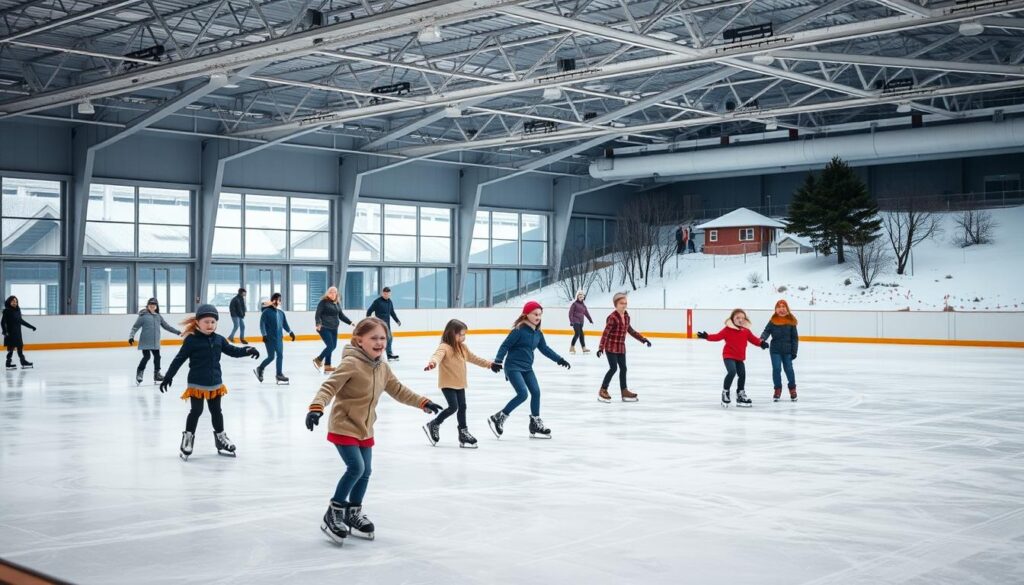
When you want to compare skating prices, it’s key to know the differences between indoor and outdoor skating costs. Each setting has its own cost factors that can affect your budget and experience.
Indoor skating offers a controlled setting with set prices. Here, you’ll find predictable costs:
- Consistent rink admission fees
- Stable equipment rental costs
- Regulated temperature conditions
Outdoor skating has more variable prices. Public parks and frozen lakes often have free skating opportunities. This can cut down your costs a lot. You won’t pay admission fees, but you’ll need to buy your own gear.
Looking at the costs of indoor and outdoor skating shows some interesting points:
| Expense Category | Indoor Skating | Outdoor Skating |
|---|---|---|
| Admission | $5-$15 per session | Often free |
| Equipment Rental | $5-$10 | Personal ownership required |
| Annual Cost | $300-$600 | $100-$300 |
Skaters looking to save money can pick between indoor and outdoor skating based on what’s available and what they like. Both offer unique skating experiences with different costs.
Budget-Friendly Skating Options
Skating doesn’t have to cost a lot. You can find many ways to enjoy it without spending too much. By using smart strategies, you can find affordable skating activities that are fun and keep you active.
Finding cheap skating lessons and activities takes some creativity. Let’s look at how to keep your skating dreams alive without spending a lot.
Community Programs for Affordable Skating
Local communities offer great chances for cheap skating. Parks, recreation centers, and community groups provide:
- Free skating clinics for beginners
- Discounted group lessons
- Low-cost skating events
- Public rink access at reduced rates
Student and Senior Skating Discounts
Being young or old can help you save on skating. Many rinks give special deals to certain groups:
| Group | Typical Discount | Additional Benefits |
|---|---|---|
| Students | 20-40% off | ID required, weekday access |
| Seniors | 15-30% off | Morning and afternoon sessions |
Off-Peak Pricing Strategies
Timing is key for cheap skating. Skating during off-peak hours can save you a lot. Early morning, weekday, and late-night sessions often have big discounts.
- Weekday morning rates are typically 30-50% cheaper
- Late-night skating can offer reduced admission
- Avoid peak weekend hours for better pricing
With these tips, you can enjoy cheap skating lessons and fun without breaking the bank. Start looking for local options and make your skating dreams affordable!
Hidden Costs in Skating Activities
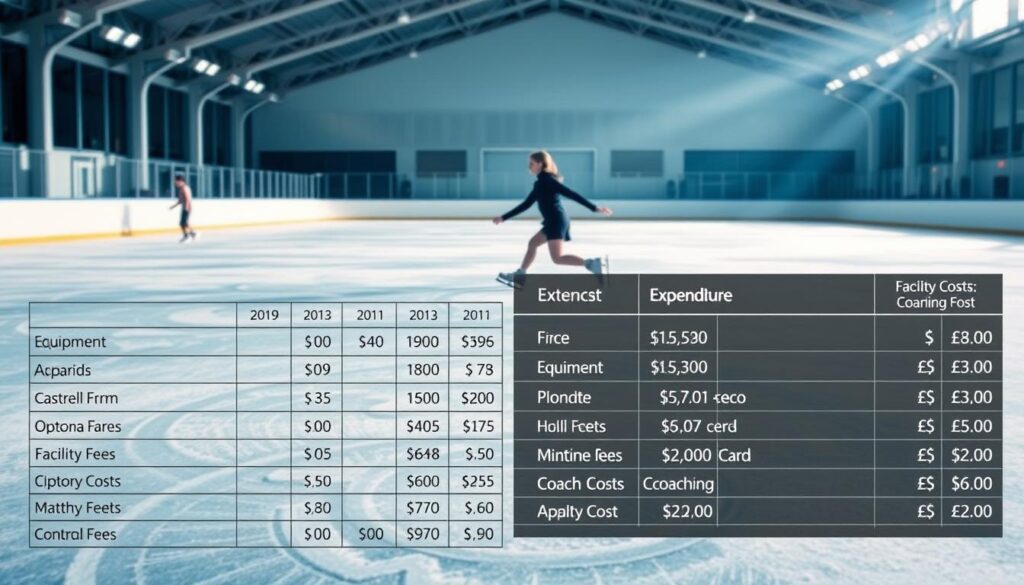
Skating fans often miss out on extra costs that add up fast. Knowing these hidden costs helps skaters plan better and avoid surprises.
When figuring out the real cost of skating, think about these extra expenses:
- Equipment Maintenance: Blade sharpening ($10-$25 per session)
- Protective gear replacement
- Transport to skating spots
- Special clothes and accessories
Skating costs aren’t just for the first time. Skaters with big budgets know ongoing costs matter a lot. Some hidden costs include:
- Physical therapy and sports massage
- Competition entry fees
- Travel for training and events
- Private coaching sessions
Skaters should plan for these costs with a detailed budget. Saving a bit each month for skating can help with unexpected costs.
Skaters who plan ahead suggest tracking all skating costs for a few months. This gives a clear view of what you’ll spend. It helps avoid financial stress and lets you enjoy skating more.
Cost Comparison: Different Types of Skating
Skating fans know that not all glides are the same. When you look at skating prices, you find interesting money matters. These can help you choose your skating style.
Skating offers many experiences, each with its own cost. Whether you’re into ice skating or other styles, knowing the cost is key.
Ice Skating vs Roller Skating: A Financial Breakdown
Deciding between ice and roller skating is more than just a preference. Let’s look at the money side:
- Equipment Costs
- Ice Skates: $50 – $500
- Roller Skates: $40 – $300
- Venue Expenses
- Ice Rink Session: $8 – $15
- Roller Rink Entry: $5 – $12
Figure Skating vs Hockey: Investment Insights
Ice sports have different money paths for fans. Figure skating and hockey need special investments. These can affect your budget a lot.
| Expense Category | Figure Skating | Hockey |
|---|---|---|
| Basic Equipment | $200 – $1,000 | $500 – $1,500 |
| Annual Training Costs | $1,500 – $5,000 | $2,000 – $6,000 |
Knowing these ice skating prices helps you choose wisely. It lets you pick the skating that fits your budget and love.
Long-Term Investment in Skating
Skating is more than a hobby; it’s a lifelong journey of growth and opportunity. It’s not just about the cost of ice skating. It’s about the financial and personal benefits it brings.
By choosing to skate long-term, you invest in many areas of your life. The initial cost might seem high, but the rewards are well worth it.
- Physical fitness improvements
- Mental health benefits
- Potential career pathways
- Social networking opportunities
Professional skaters show how passion can lead to a lasting career. They start with basic gear and local rinks. Over time, they build skills for coaching, competitions, or performances.
Thinking about the financial side of long-term skating includes:
- Quality equipment upgrades
- Advanced training programs
- Competition registration fees
- Travel and accommodation expenses
Planning your skating investment wisely can help manage costs. It also maximizes personal and professional growth. Regular practice, choosing the right gear, and focusing on skills can turn skating into a fulfilling life path.
Tips for Reducing Skating Expenses
Skating doesn’t have to be expensive. Smart skaters find ways to enjoy it without spending a lot. By using smart strategies, you can find affordable lessons and activities that keep your skills sharp and your wallet happy.
Start by exploring cost-effective strategies for your skating journey:
- Rent before buying: Test out different skating styles with rental equipment
- Look for community program discounts
- Join group lessons for more affordable instruction
- Purchase second-hand gear from reputable sources
Equipment can be a big expense for skaters. Strategic shopping can help you save money without sacrificing quality. Here are some tips:
- Check local sports consignment shops
- Watch for end-of-season sales
- Compare prices across multiple retailers
- Look for package deals on protective gear
Enjoying skating doesn’t mean you have to spend a lot. Many rinks offer deals like multi-session passes and loyalty programs. Student and senior discounts can also save you money on lessons.
Doing your own maintenance can also save you money. Learning basic skate care can make your equipment last longer and save you from expensive repairs. Watch online tutorials, attend free workshops, and talk to experienced skaters for tips.
Conclusion
Skating is more than a sport; it’s an adventure that mixes passion with smart money management. By looking at skating prices in different areas, you find many ways to enjoy it without spending too much. Whether it’s at roller rinks or ice arenas, knowing the costs helps you choose wisely based on your budget and skill.
Our guide has shown you how to save money while having fun skating. It doesn’t matter if you’re into figure skating, hockey, or just gliding on weekends. The tips we shared can help you deal with the costs of your skating journey. No more feeling overwhelmed by equipment, lessons, or venue fees.
The key message is that skating is an investment in yourself. It’s not just about money, but also about growing, staying fit, and enjoying life. By using the tips we discussed, you can make your skating experience affordable and fulfilling. Your next skating adventure is waiting, with better spending and lots of possibilities.
Are you ready to start skating? Share your best budget-friendly skating tip or a recent rink visit in the comments below. Your story could inspire someone to take their first skate!
